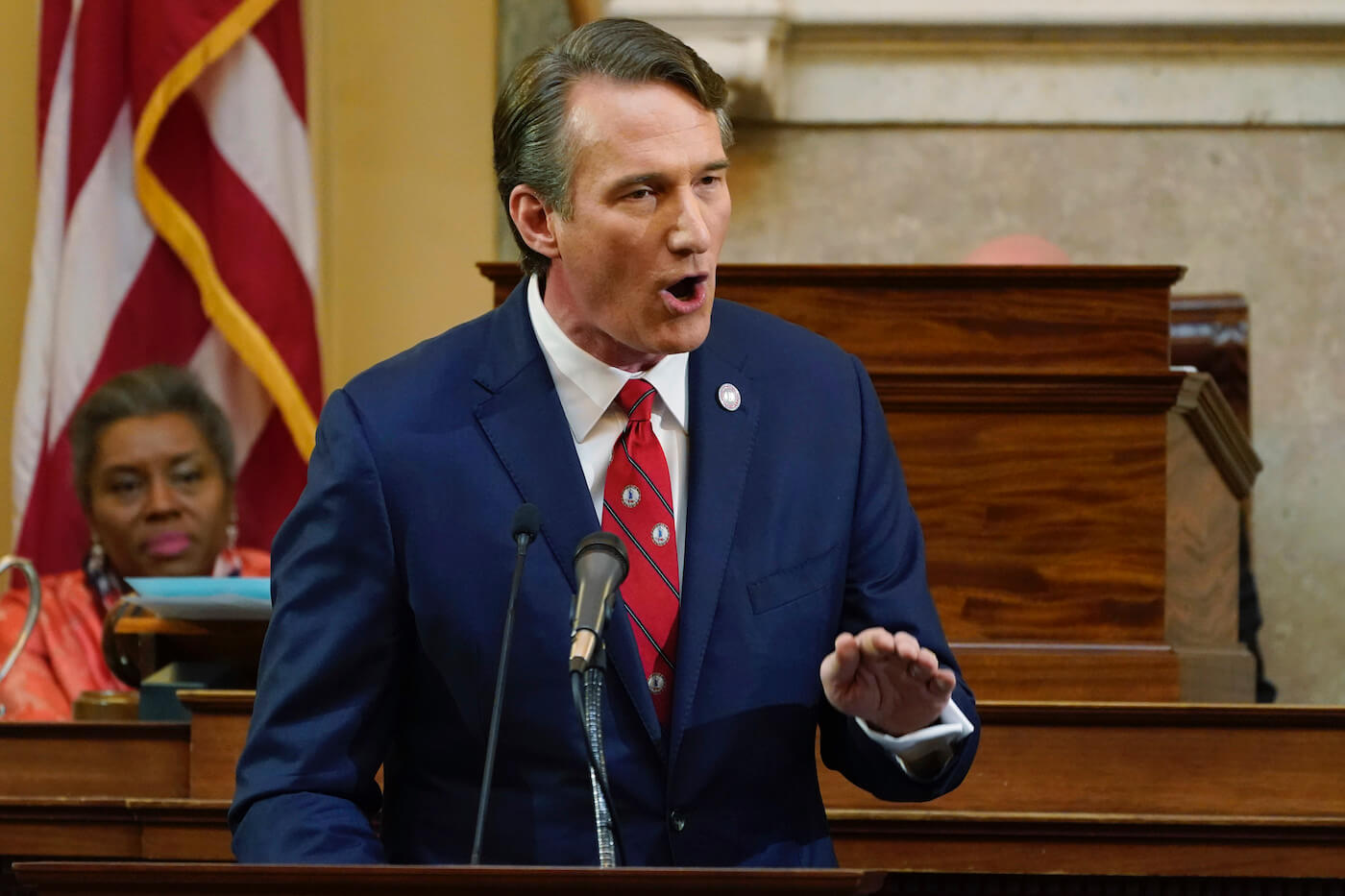
Virginia Gov. Glenn Youngkin gestures as he delivers his State of the Commonwealth address before a joint session of the Virginia General Assembly in the House chambers at the Capitol Monday Jan. 17, 2022, in Richmond, Va. (AP Photo/Steve Helber)
During the nationally-televised conversation, Gov. Youngkin was asked if he would take any steps to help codify same-sex marriage into Virginia’s constitution.
On Sunday, Republican Gov. Glenn Youngkin made an appearance on the CBS Sunday morning program “Face The Nation,” where he and Robert Costa talked about abortion, “inherently divisive concepts,” and his most recent trip to Nebraska. He was also asked about same-sex marriage, which is not actually codified in Virginia’s state constitution.
Costa asked Youngkin if he would take steps to codify same-sex marriage in Virginia, as the Supreme Court could take on cases like the landmark Obergefell v. Hodges.
“In Virginia, we actually do protect same-sex marriage in Virginia. That’s the law in Virginia and therefore as Governor of Virginia, we protect same-sex marriage,” he responded, also noting that states should make major decisions, instead of “an executive branch to pass rules and regulations that overstep boundaries.”
After his appearance, several of Virginia’s lawmakers, including Del. Danica Roem and Rep. Abigail Spanberger, not only called him out on social media for the error, but corrected him as well.
Since 2006, the Virginia State Constitution states that marriage can only be between one man and one woman. There have been efforts to amend the constitution to repeal the language over the years, including a recent effort during the most recent General Assembly session, but efforts have fallen flat, even under Democratic leadership. Efforts to repeal the amendment also took place in 2009, 2015, 2016, and 2018.
Virginia’s Constitution requires any potential new amendments to be passed in two different General Assembly sessions that are separated by a general election. During the 2005 General Assembly session, Senate Joint Resolution (SJ) 337, and its House counterpart, House Joint Resolution (HJ) 586, both were passed. During the 2006 General Assembly session, separated by the previous year’s session by the 2005 November General Election, Senate Bill (SB) 526 and its House counterpart House Bill (HB) 101 were passed, clearing the way for Virginians to vote on a new constitutional amendment.
Dubbed the Marshall-Newman Amendment, Virginians passed the measure that banned same-sex marriage, using language that defined what the definition of “marriage” should be. More than 57% of Virginia’s voters voted “yes” to ratify the amendment during the 2006 General Election, where the amendment appeared on ballots as Question 1.
In 2013, Norfolk residents Timothy Bostic and Tony London, who had been in a relationship since the late 1980s, challenged Virginia’s same-sex marriage ban, because they were denied a marriage license. On February 13, 2014, US District Court Judge Arenda Wright Allen deemed that the same-sex marriage ban was unconstitutional. The ruling was upheld in the Fourth Circuit Court of Appeals in July of that same year. In October 2014, a writ of certiorari was issued by the Supreme Court, which allowed the decision of the Fourth Circuit Court to stand.
The Supreme Court would then take up the landmark Obergefell v. Hodges case in 2015, ruling that same-sex couples have the fundamental right to marry. Because of that decision, Sen. Adam Ebbin, the first openly gay man to be elected to Virginia’s Senate, sponsored several pieces of legislation over the years that would help change the language of the code, but each piece of legislation never passed.
Since Supreme Court decisions are essentially law of the land, that negated the language of the same-sex marriage ban in Virginia’s Constitution, even though it remains in the Constitution.
Democrats in both Virginia’s House and Senate made efforts to repeal the Marshall-Newman Amendment during the 2021 General Assembly session, but an amendment must be approved a second time in order to potentially reach voters’ ballots. In February 2022, legislation that would have given voters a chance to vote to repeal the amendment was struck down by a House committee. Because of that decision, a question to repeal the amendment will not appear on ballots.
In a 2021 Associated Press article, then-candidate Youngkin was asked about his views on same-sex marriage, where he said that he “feels called to love everyone,” even though he did not support same-sex marriage. He did note that it was “legally acceptable” in the commonwealth, and that if elected, “I, as governor, will support that.”
Politics

Biden administration bans noncompete clauses for workers
The Federal Trade Commission (FTC) voted on Tuesday to ban noncompete agreements—those pesky clauses that employers often force their workers to...

Democratic shakeup in Virginia primaries for governor, lieutenant governor
Richmond Mayor Levar Stoney quit his bid for governor and jumped into the race to be the Democratic nominee for lieutenant governor. The race for...
Local News

Virginia verses: Celebrating 5 poetic icons for National Poetry Month
There’s no shortage of great writers when it comes to our commonwealth. From the haunting verses of Edgar Allan Poe, who found solace in Richmond's...

Join the fun: Recapping Family Literacy Night’s storybook adventures
When’s the last time you read a book aloud with a loved one? If it’s difficult to answer that question, then maybe it’s time to dust off that TBR...





